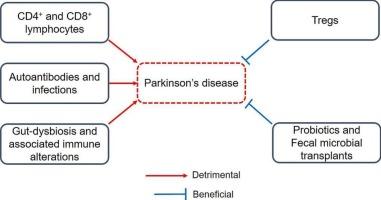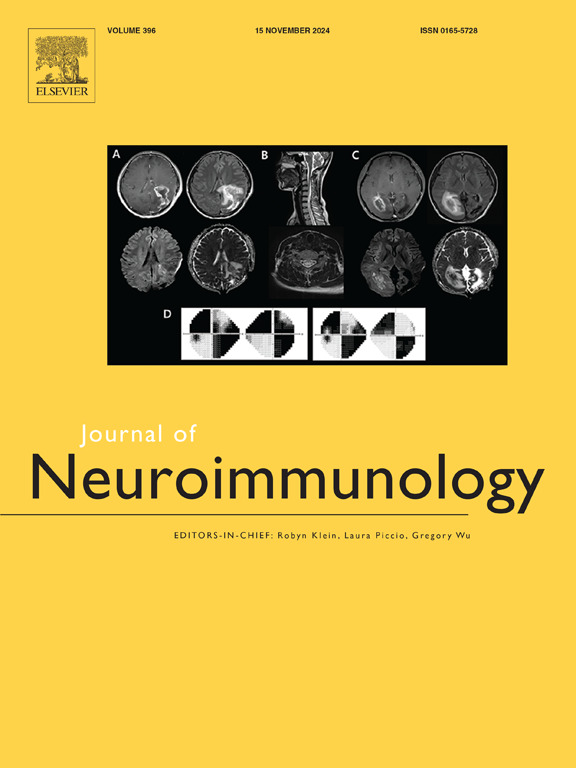帕金森病的免疫-适应性和自身免疫反应和肠道微生物轴的作用
IF 2.5
4区 医学
Q3 IMMUNOLOGY
引用次数: 0
摘要
帕金森病(PD)是第二常见的神经退行性疾病。其特征是中脑多巴胺能神经元的丧失和α-突触核蛋白聚集体(称为路易体)的积累。帕金森病是一种进行性疾病,现有的治疗方法仅针对其症状。免疫失调是PD发病机制的几种假说之一。本文首先阐述了先天免疫和适应性免疫成分的相互作用以及适应性免疫反应的作用,特别关注T淋巴细胞在PD中的作用。其次,本综述探讨了自身免疫系统参与PD的证据,包括自身抗体的存在以及自身免疫与PD相关蛋白(α-突触核蛋白和神经黑色素)和感染的关联。第三,综述探讨了肠道菌群与免疫系统之间的联系以及这种关系对PD发病过程的影响。最后,本文讨论了基于适应性免疫的PD治疗策略,基于自身免疫的PD检测方法,以及肠道微生物群补充在PD治疗中的潜力。本文章由计算机程序翻译,如有差异,请以英文原文为准。

Immunity in Parkinson's disease - the role of adaptive and auto-immune responses and gut-microbiome axis
Parkinson's disease (PD) is the second most common neurodegenerative disorder. It is characterised by loss of dopaminergic neurons in the mid-brain and accumulation of α-synuclein aggregates referred to as Lewy bodies. PD is a progressive disease and the treatments available are aimed at addressing only its symptomatology. Immune dysregulation is one of the several mechanisms that are hypothesized to contribute towards PD pathogenesis. This review firstly addresses the interaction of innate and adaptive immune components and the role of adaptive immune responses, with a particular focus on T lymphocytes in PD. The review secondly examines the evidence for the involvement of the autoimmune system in PD, including the presence of autoantibodies and the association of autoimmunity with proteins linked with PD (α-synuclein and neuromelanin) and with infections. The review thirdly explores the connection between the gut microbiota the immune system and the impact of this relationship on the pathogenic processes of PD. Finally, this review discusses adaptive immunity based therapeutic strategies for PD, probable PD detection approaches based on autoimmunity, and the potential of gut-microbiome replenishment in PD treatment.
求助全文
通过发布文献求助,成功后即可免费获取论文全文。
去求助
来源期刊

Journal of neuroimmunology
医学-免疫学
CiteScore
6.10
自引率
3.00%
发文量
154
审稿时长
37 days
期刊介绍:
The Journal of Neuroimmunology affords a forum for the publication of works applying immunologic methodology to the furtherance of the neurological sciences. Studies on all branches of the neurosciences, particularly fundamental and applied neurobiology, neurology, neuropathology, neurochemistry, neurovirology, neuroendocrinology, neuromuscular research, neuropharmacology and psychology, which involve either immunologic methodology (e.g. immunocytochemistry) or fundamental immunology (e.g. antibody and lymphocyte assays), are considered for publication.
 求助内容:
求助内容: 应助结果提醒方式:
应助结果提醒方式:


